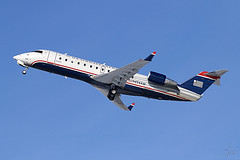Reputation vs. National Security: The Supreme Court Takes on an Airline Defamation Case
Citizen Media Law Project 2013-07-10
Summary:
 The Supreme Court has granted certiorari to the first defamation case it's heard since 1990, and in it, the Court will be balancing injury to reputation against -- what else? -- national security.
The Supreme Court has granted certiorari to the first defamation case it's heard since 1990, and in it, the Court will be balancing injury to reputation against -- what else? -- national security.In Air Wisconsin Airlines Corp. v. Hoeper, the Colorado Supreme Court upheld a $1.4 million defamation suit against an airline after an Air Wisconsin employee reported a potential security threat to the TSA. In affirming the lower court, the court denied the airline immunity under the Aviation and Transportation Security Act (ATSA), an act giving broad immunity to airlines when reporting possible safety risks -- and acknowledged this case as the first reported case rejecting this immunity.
The case developed from events surrounding a pilot's termination from Air Wisconsin. According to the Colorado Supreme Court's opinion, after pilot William Hoeper failed three proficiency tests required to pilot a type of aircraft he hadn't flown before, Hoeper was given one last opportunity to pass the test. During the final test, Hoeper "believed that the test administrators were deliberately sabotaging his testing," which caused him to get angry, use profanity, and "bl[o]w up" at one of the test administrators. Hoeper did not complete the test, but told the administrator that he planned on calling the legal representative of his airline pilots' union and left to take a flight as a passenger from Virginia back to his home in Denver.
The administrator talked about the confrontation to Air Wisconsin manager Patrick Doyle, who knew that Hoeper was a federal flight deck officer (FFDO) -- a pilot issued a firearm and deputized as a federal law enforcement officer to defend the flight deck. After considering this information and the circumstances, without knowing whether Hoeper had his firearm on him, Doyle called TSA to report Hoeper as a possible threat. According to the TSA, Doyle said that Hoeper was an FFDO who might be armed, that he and other airline employees were concerned about Hoeper's mental stability and the whereabouts of his firearm, and that an "[u]nstable pilot in [the] FFDO program was terminated [that day]." That phone call, after which the TSA removed Hoeper from his flight and questioned him, forms the basis of the lawsuit.
The ATSA states that an air carrier or air carrier employee "who makes a voluntary disclosure of any suspicious transaction relevant to a possible violation of law or regulation, relating to air piracy, a threat to aircraft or passenger safety, or terrorism" cannot be civilly liable under any law or regulation in the United States. The ATSA, however, specifies that this immunity does not apply to disclosures made with actual malice -- "(1) any disclosure made with actual knowledge that the disclosure was false, inaccurate, or misleading; or (2) any disclosure made with reckless disregard as to the truth or falsity of that disclosure."
Air Wisconsin argued that these provisions barred the claim and, alternatively, that Hoeper's defamation claim failed because he could not prove actual malice as the statements made to the TSA were substantially true. However, the trial court jury -- as the trial court had determined that ATSA immunity was a question of fact -- returned a verdict for Hoeper. The appellate court agreed, and the Colorado Supreme Court affirmed. Although it held that immunity was a question of law, the Colorado Supreme Court decided that the lower courts' errors were harmless because immunity did not attach to the statements. The court noted, "In our determination of immunity under the ATSA, we need not, and therefore do not, decide whether the statements were true or false." While recognizing the "importance to our national security of the threat disclosure encouraged by the ATSA and the unique position of air carriers to obtain information about those threats," the court found, without reviewing whether Air Wisconsin's statements were true or false, that the airline had "overstated those events to such a degree that they were made with reckless disregard of their truth or falsity."
The Supreme Court's grant of certiorari is limited to the following issue: whether immunity under the ATSA may be denied without a determination that the air carrier's disclosure was materially false. Air Wisconsin's petition for certiorari stated that the Colorado Supreme Court "committed serious error in interpretin
Link:
http://feedproxy.google.com/~r/CitizenMediaLawProject/~3/dx_zV_m1dio/reputation-vs-national-security-supreme-court-takes-airline-defamation-caseUpdated:
07/10/2013, 13:38From feeds:
Fair Use Tracker » Current Berkman People and ProjectsBerkman Center Community - Test » Citizen Media Law Project